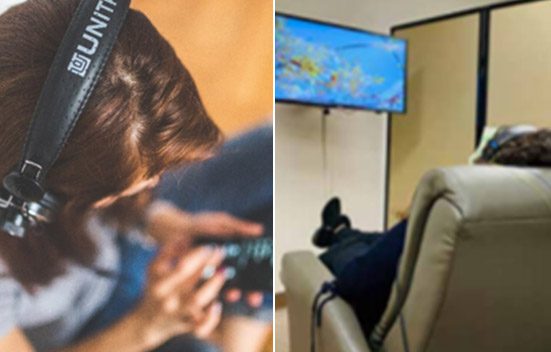Anxiety attacks, also known as panic attacks, can be overwhelming and lead to intense feelings of fear and panic. It’s important to recognize the symptoms of an anxiety attack which may include shortness of breath, heart palpitations, sweating, trembling, nausea, dizziness, and a feeling of impending doom.
One effective way to reduce the symptoms of an anxiety attack is to practice deep breathing. Sit in a comfortable position and take slow, deep breaths, inhaling through your nose and exhaling through your mouth. You can also challenge negative thoughts and beliefs that can trigger anxiety attacks. Replace them with more realistic and positive ones to help reduce the intensity of the attack.
Grounding techniques can help you stay present in the moment and reduce the intensity of an anxiety attack. One effective grounding technique is to use your senses. Name five things you can see, four things you can touch, three things you can hear, two things you can smell, and one thing you can taste. Another grounding technique is to tense and relax your muscles.
Seeking support from friends, family, or a mental health professional can also be helpful during an anxiety attack. We had a client come to us named Lisa who was experiencing debilitating anxiety attacks many times a day. Soon after the start of her neurofeedback brain training program, her anxiety attacks as well as her anxiety levels receded and eventually completely disappeared.
Things like practicing self-care are important for managing anxiety and preventing anxiety attacks. Make sure you are getting enough sleep, eating a healthy diet, and engaging in regular exercise. However, if you are seeking to find true long-term change neurofeedback is what you are looking for.
It’s important to limit or avoid caffeine and alcohol if you are prone to anxiety attacks as they can trigger symptoms. In some cases, medication may be prescribed to manage anxiety symptoms. If you have been prescribed medication, it is important to take it as directed and discuss any concerns or side effects with your healthcare provider. However, it is the InnerOptimal perspective that medication should be taken only when truly necessary since in many cases more natural solutions like neurofeedback sessions, also called biofeedback with EEG, can be a solution.
Visualization techniques can be helpful in reducing anxiety symptoms. Picture yourself in a peaceful and calming environment, such as a beach or a forest. Focus on the details of the environment, such as the sound of the waves or the rustling of the leaves. Use this visualization to help you feel calmer and more relaxed. Finally, it is important to practice acceptance when it comes to anxiety attacks. Remember that anxiety attacks are not dangerous and will eventually pass. Visualizations are part of what we teach in our programs! We have seen its positive effects on ourselves and those we help.
It is also important to remember that everyone experiences anxiety differently and what works for one person may not work for another. It can take time to find the right coping mechanisms that work best for you. It is also important to understand that anxiety attacks can be triggered by different things, such as stressful situations or past trauma. If you notice patterns or triggers for your anxiety attacks, it may be helpful to address them with a therapist. Therapists often recommend to their patients to take our programs as it allows us to help speed up the process and reach a state of brain alignment and calm more easily and quickly.
If you experience frequent anxiety attacks, it may be helpful to create a self-care plan that includes coping mechanisms and strategies to help you manage your anxiety. This plan can include things like journaling, meditation, or engaging in a hobby you enjoy. This way to have things that you are able to continuously turn to in times of need. One of the primary benefits of neurofeedback is precisely the long-lasting effects. Our clients experience a change last that’s far beyond the length of the program. We once had a client named Ruben who came to us because of his frequent anxiety attacks. He told us of a stressful moment on his wedding day, everyone was ready and prepared at the church building when they realized that the person responsible for driving to pick up the Bride and Maid of Honor had forgotten! He told us that had this occurred before his neurofeedback program he would have broken down into an anxiety attack. Instead, he was able to stay calm and go pick them up himself. The remarkable part of this story is that his program had ended three years before this event. The positive effects of neurofeedback stayed with him three years later!
In addition to self-care, it can be helpful to engage in therapy or counseling to address underlying issues that may be contributing to your anxiety. Cognitive-behavioral therapy (CBT) is one type of therapy that can be effective for treating anxiety. CBT focuses on changing negative thought patterns and beliefs that can trigger anxiety attacks.
 It is also important to address any physical symptoms that may be contributing to your anxiety. This may include getting treatment for a medical condition or addressing any sleep issues. Getting enough restful sleep is important for managing anxiety and preventing anxiety attacks.
It is also important to address any physical symptoms that may be contributing to your anxiety. This may include getting treatment for a medical condition or addressing any sleep issues. Getting enough restful sleep is important for managing anxiety and preventing anxiety attacks.
In some cases, medication may be prescribed to manage anxiety symptoms. If you have been prescribed medication, it is important to take it as directed and discuss any concerns or side effects with your healthcare provider. It is also important to understand that medication is not a cure for anxiety and should be used in conjunction with therapy and self-care.
Another effective way to manage anxiety is to practice mindfulness. Mindfulness involves staying present in the moment and accepting your thoughts and feelings without judgment. This can help you feel more grounded and reduce the intensity of anxiety symptoms. There are many mindfulness techniques, such as meditation or body scans, that can be practiced regularly to help manage anxiety.
In addition to these techniques, it can be helpful to develop a support system for people who understand what you are going through. This may include friends, family members, or a support group for people with anxiety. Knowing that you have a support system can help you feel less alone and more empowered to manage your anxiety.
It is also important to recognize that seeking help for anxiety is a sign of strength, not weakness. Many people struggle with anxiety, and there is no shame in seeking professional help to manage your symptoms. It takes courage to confront your anxiety and take steps to manage it.
In conclusion, anxiety attacks can be overwhelming and debilitating, but there are many effective strategies for managing them. It is important to recognize the symptoms of an anxiety attack, practice deep breathing and grounding techniques, seek support from a therapist or loved ones, and engage in self-care. It may take time to find the right coping mechanisms that work best for you, but with patience and persistence, you can learn to manage your anxiety and lead a fulfilling life. Remember, seeking help for anxiety is a sign of strength, and you are not alone in your struggle. If you are interested in learning about our anxiety programs then click here.
The InnerOptimal Team





